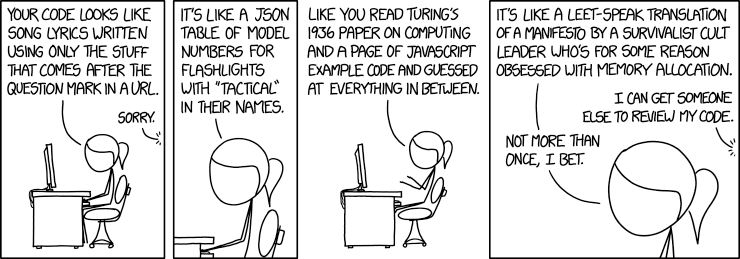# Bad Code
If my task is to help you "speed up code", then I feel that the first
part is to help you maintain it.
This is one of the 10/90 principles of programming: 10% of the time
will be spent writing a program; 90% of the time will be spent
maintaining it.[^other]
Let's start by looking at a code fragment. For the sake of argument,
assume that it "works," in the sense that it's part of a larger
program that produces the results that you expect.
Pick the Python version or the C++ version. Can you figure out what,
in my opinion, is wrong with this code?
:::{code-block} python
:name: bad-python-code
:caption: What's wrong with this Python code?
# Compute the vector product of the two velocities
i = 10
while j < i+1:
k = i + 3
s[j] = s[j] + k*j
j = j + 1
:::
:::{code-block} c++
:name: bad-c-code
:caption: What's wrong with this C++ code?
// Compute the vector product of the two velocities
int i = 10;
while (j < i+1) {
int k = i + 3
s[j] = s[j] + k*j
j = j + 1
}
:::
:::{hint}
In my opinion:
- There are at two execution-speed problems with this code (though
they affect the Python version more than the C++ version). There
is also a separate speed problem with only the Python code.
- There are also at least two programming-style problems with the
above code.
:::
My answers are in the next section.
:::{admonition} Is this worth it?
:class: note
It's natural to ask this question. We're all busy. If the code works,
why make a fuss about it?
I offer the following in response:
- If code is unclear, it will be harder to maintain. You may feel
that's the next person's problem. Except that the next person is
likely to be you!
Suppose you've have a program that performs a cluster-finding
algorithm. It works, but it's quickly and sloppily written. You
save it and move on to your next project.
Six months later, your team comes back to you: "You're the
cluster-finding expert. Update your code so that it accommodates
this revision." Of course, you've forgotten about your old
code.[^remember] You look at it now... and realize that five seconds
worth of effort back then would have saved you hours or days
re-analyzing your old code to figure out what it did.
- Typically, physics groups don't do code review. But professional
programming environments do.
A "code review" is when a group of
programmers looks over your code to see if it's acceptable to add
to a project, in much the same way a physics group will review a
paper to see if it's acceptable for publication. If you find
yourself in a programming group, they're not going to accept your
code if has the kinds of flaws I discuss here.
- When looking at code, physicists tend to treat it as a
"black box":[^black] They assume it just works, and use it as-is without
thinking or even understanding what it does.
Maybe this sounds fine, but put it in the context of
quickly-written, sloppy, or slow code. In 2021, I wrote a
quick-and-dirty bit of analysis code to answer a single
question. In 2022, students copied that code, treated it as
"perfect"[^reason] and used it in a loop to analyze 150 times
more events than I did in my brief study. Result: Their analysis code
ran slowly, because I hadn't put in the time to write proper
code.
:::
:::{figure-md} code_quality_3-fig
:align: center
 by Randall Munroe
:::
[^other]: The other 10/90 principle is that 10% of the code is
responsible for 90% of a program's execution time. We'll deal with
creating faster code in the next section.
[^remember]: I know you think you'll remember. You won't. Although
arguments from authority are always suspect, please take it from
someone who's been programming for over five decades.
[^black]: In this discussion, when I say "physicists like to put
things in a black box," it's not exclusive. Other fields of study
also tend to put things in a black box. However, since I mostly
hang out with physicists and not pharmacists or airline pilots,
I'll only speak for the folks I know.
[^reason]: For some reason they thought that, because I had written
it, my code was superior to anything they could write. I can't
begin to tell you how false that reasoning is.
by Randall Munroe
:::
[^other]: The other 10/90 principle is that 10% of the code is
responsible for 90% of a program's execution time. We'll deal with
creating faster code in the next section.
[^remember]: I know you think you'll remember. You won't. Although
arguments from authority are always suspect, please take it from
someone who's been programming for over five decades.
[^black]: In this discussion, when I say "physicists like to put
things in a black box," it's not exclusive. Other fields of study
also tend to put things in a black box. However, since I mostly
hang out with physicists and not pharmacists or airline pilots,
I'll only speak for the folks I know.
[^reason]: For some reason they thought that, because I had written
it, my code was superior to anything they could write. I can't
begin to tell you how false that reasoning is.
